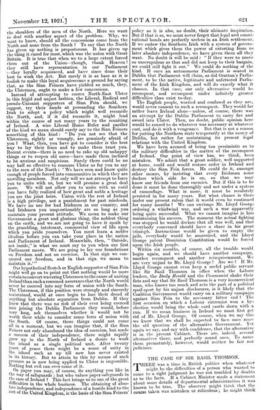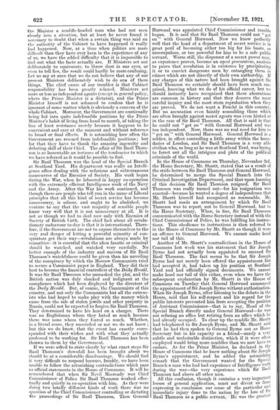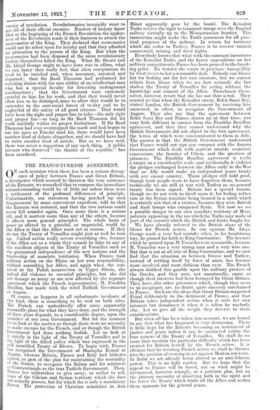THE CASE OF SIR BASIL THOMSON. T HERE was a time
in British politics when whatever might be the difficulties of a person who wanted to come to a right judgment he was not troubled by doubts as to the facts. If a Cabinet. Minister made a statement about some details of departmental administration it was known to be true. The observer might think that the course taken was mistaken or ridiculous ; he might think the Minister a muddle-headed man who had not seen clearly into a situation, but at least he never found it necessary to doubt that when a certain thing was said on the authority of the Cabinet to have happened it really had happened. Now, at a time when politics are more difficult than they have ever been in the experience of any of us, we have the added difficulty that it is impossible to find out what the facts actually are. If Ministers set out deliberately to equivocate, to throw dust in our eyes, or even to tell lies, the result could hardly be more confusing. Let us say at once that we do not believe that any of our present Ministers deliberately wish to do one of these things. The chief cause of our troubles is that Cabinet responsibility has been greatly relaxed. Ministers act more or less as independent agents (except in general policy, where the Prime Minister is a dictator), and the Prime Minister himself is not ashamed to confess that he is ignorant of some matter which is obviously a concern of the whole Cabinet. Moreover, the Government are continually being led into quite indefensible positions by the Prime Minister's habit of living from hand to mouth, of taking the line of least resistance merely because it happens to be convenient and easy at the moment and without reference to broad or final effects. It is astonishing how often the Government are rescued from indefensible positions ; but for that they have to- thank the amazing ingenuity and debating skill of their Chief. The affair of Sir Basil Thom- son is as lamentable an instance of the tendencies to which we have referred as it would be possible to find. Sir Basil Thomson was the head- of the Special Branch at Scotland Yard. His department was really an Intelli- gence office dealing with the nefarious and subterraneous manoeuvres of the Enemies of Society. His work began during the War, when he laboured in happy co-operation with the extremely efficient Intelligence work of the Navy and the Army. After the War his work continued, and though there are people who tell you in the name of Liberal principles that all this kind of secret service has become unnecessary, is odious, and ought to be abolished, we venture to say that the vast majority of sensible people know very well that it is not unnecessary at all. It is not as though we had to deal now only with Enemies of Society of British l-irth. The chief fact about all revolu- tionary endeavour to-day is that it is international. There- fore, if the Government are not to expose themselves to the very real danger of letting a powerful minority of con- spirators get their way—revolutions are always made by minorities—it is essential that the alien fanatic or criminal should be watched, and watched very carefully. No better example of the industry and success of Sir Basil Thomson's watchfulness could be given than his unveiling of the conspiracy by which the Moscow Communists tried to secure a Communist paper in England. They did their best to become the financial controllers of the Daily Herald. It was Sir Basil Thomson who unmasked the plot, and the British nation was duly shocked and indignant at the compliance which had been displayed by the directors of the Daily Herald. But, of course, the Communists of this country, and not only the Communists but all the extrem- ists who had hoped- to make play with the money which came from the sale of stolen jewels and other property in Russia, could not be expected to forgive Sir Basil Thomson. They determined to have his head on a charger. There was no Englishman whom they hated so much because there was none whom they feared so much. Whether, in a literal sense, they succeeded or not we do not know ; but this we do know, that the event has exactly corre- sponded with their wishes and with what they actually professed to be working for. Sir Basil Thomson has been thrown to them by the Government. If we were asked to-state clearly by what exact steps Sir Basil Thomson's downfall has been brought about we should be at a considerable disadvantage. We should find it very difficult to respond because, frankly, we have been unable to follow the astonishing contradictions which pass as official statements in the House of Commons. It will be remembered that when Sir Nevil Macready was Chief Commissioner of Police Sir Basil Thomson worked effec- tually and quietly in co-operation with him. As they were doing two totally different kinds of work there was no question of the Chief Commissioner controlling or dictating the proceedings of Sir Basil Thomson. Then General Florwood was appointed Chief Commissioner and trouble began. It is said that Sir Basil Thomson could not " get on ' with General Horwood. Now we know perfectly well that the head of a department of secret service is in great peril of becoming either too big for his boots, or unscrupulous, or too powerful for him to be a safe public servant. Worse still, the dispenser of a secret power may, as experience proves, become an agent provocateur, anxious to prove that revolution is in existence by precipitating it or to convict dangerous 'men by entangling them in crimes which are not directly of their own authorship. If any charges of this nature had been brought against Sir Basil Thomson we certainly should have been much sur- prised, knowing what we do of his official career, but we should instantly have recognized that these aberrations are common in history and that they deserve the most careful inquiry and the most stern reprobation when they are proved. We do not want a Fouche in this country. But no accusation even faintly resembling those which are often brought against secret agents was even hinted at in the case of Sir Basil Thomson. All that is said is that he could not " get on " with General Horwood and was too independent. Now, there was no real need for him to " get on ' with General Horwood. General Horwood is a soldier, in effect controlling a little army within the boun- daries of London, and Sir Basil Thomson is a very able civilian who, so long as he was at Scotland Yard, was trying to ferret out all the intrigues and plots of the political criminals of the world.
In the House of Commons on Thursday, November 3rd, the Home Secretary, Mr. Shortt, stated that as a result of the strife between Sir Basil Thomson and General Horwood, he determined to merge the Special Branch into the Criminal Investigation Department, and that upon learning of this decision Sir Basil Thomion resigned. Sir Basil Thomson was really turned out—for his resignation was exacted—because he wanted a degree of independence that Mr. Shortt himself had recognized as reasonable. Mr. Shortt had made an arrangement by which Sir Basil Thomson was to report, not to General Horwood, but to the Home Secretary. When, in fine, Sir Basil Thomson communicated with the Home Secretary instead of with the Chief Commissioner of Police, he was fulfilling his instruc- tions. This obedience to instructions is then referred to in the House of Commons by Mr. Shortt as though it were an offence to General Horwood. We cannot make head nor tail of this.
Another of Mr. Shortt's contradictions in the House of Commons last week was his statement that Sir Joseph Byrne had not actually been appointed to succeed Sir Basil Thomson. The fact seems to be that Sir Joseph Byrne had not merely been offered the appointment but had accepted it, had taken up his position at Scotland Yard and had officially signed documents. We cannot make head nor tail of this either, even when we have the subsequent explanation by Mr. Shortt in the House of Commons on Tuesday that General Horwood announced the appointment of Sir Joseph Byrne without authorization. When Sir Joseph Byrne, after listening to the debate in the House, said that his self-respect and his regard for the public interests prevented him from accepting the position of Assistant Commissioner—that is to say, Head of the Special Branch directly under General Horwood—he was not refusing an office but retiring from an office which he had already occupied. To clear up the muddle Mr. Shortt had telephoned to Sir Joseph Byrne, and Mr. Shortt said that he had then spoken to General Byrne not as Home Secretary but in his capacity as a friend—surely a very subtle and undesirable distinction, which if it were often employed would bring more muddles than we now have to endure. As for the Prime Minister, he declared in the House of Commons that he knew nothing about Sir Joseph Byrne's appointment, and he added the astonishing remark that the Government wanted for the Special Branch a man who had had experience of Intelligence work during the war—the very experience which Sir Basil Thomson had above all other men. All this confusion, though it contains a very important lesson of general application, must not divert us front expressing in conclusion our sense of the particular and immediate injury done to the nation by the loss of Sir Basil Thomson as a public servant. -- He was the greatest enemy of revolution. Revolutionaries invariably want to get rid of their official enemies. Readers of history know that at the beginning of the French Revolution the spokes- men of the Revolution made A their business to attack the mercenaries of the King. They declared that mercenaries could not be relied upon for loyalty and that they afforded no protection to the person of the King. But when the mercenaries had been disposed of the same revolutionary leaders themselves killed the King. What Mr. Shortt and Mr. Lloyd George ought to have done was to affirm, what we can fancy they really feel, that alien conspirators do need to be watched and, when necessary, arrested and deported ; that Sir Basil Thomson had performed his watching duties with the rare ability of an intellectual man who has a special faculty for detecting underground machinations ; that the Government were extremely grateful to him for his work, and that they would never allow him to be dislodged, since to allow that would be to surrender to the anti-social forces of to-day and to be neglectful of the safety of all good citizens. That would have been the right and proper line to take—the only right and proper line—so long as Sir Basil Thomson did his work dutifully within its proper limitations. If Sir Basil Thomson had ever overstepped the mark and had begun to use his spies as Fouche used his, there would have been another kind of debate altogether, and we should have had to write another kind of article. But as we have said, there was never a suggestion of any such thing. A public servant who deserved the thanks of the republic" has been sacrificed.








































 Previous page
Previous page